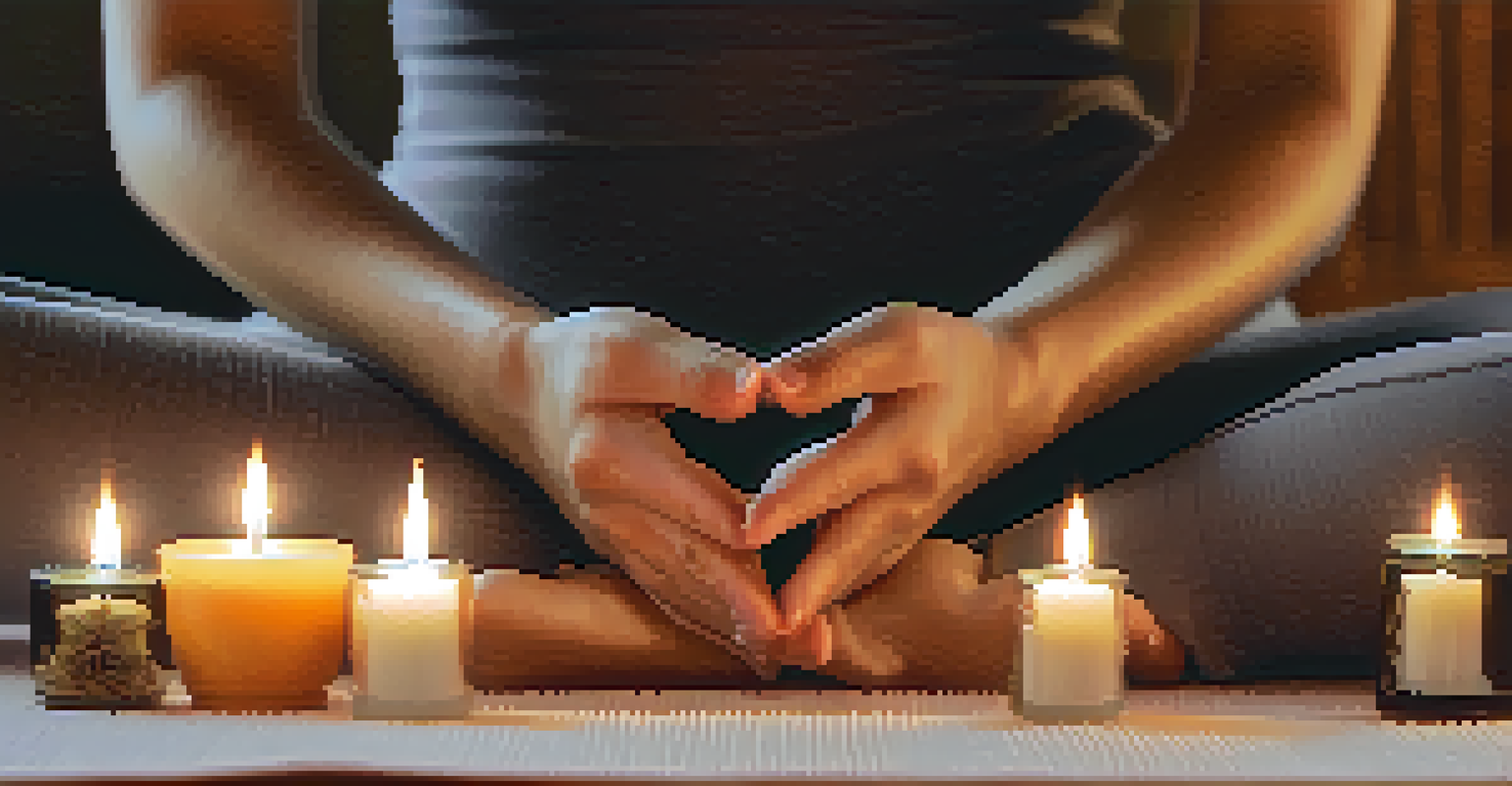The Impact of Hatha Yoga on Anxiety Reduction and Relaxation

Understanding Hatha Yoga and Its Principles
Hatha Yoga is a branch of yoga that emphasizes physical postures, breathing techniques, and meditation. Its name translates to 'sun' (Ha) and 'moon' (Tha), symbolizing the balance of opposing forces within the body. This balance is crucial for promoting overall well-being and tranquility, making Hatha Yoga a great choice for those seeking to alleviate anxiety.
Yoga is the journey of the self, through the self, to the self.
At its core, Hatha Yoga encourages practitioners to connect with their bodies through mindful movements and conscious breathing. This connection helps to ground individuals, providing a sense of stability and calm. By focusing on the present moment, Hatha Yoga creates a safe space to explore one's thoughts and emotions without judgment.
Moreover, the slow and gentle nature of Hatha Yoga makes it accessible for people of all ages and fitness levels. Whether you are a seasoned yogi or a complete beginner, Hatha Yoga invites you to engage with your body at your own pace, fostering a welcoming environment that promotes relaxation.
The Connection Between Yoga and Anxiety Reduction
Research has shown that yoga can significantly reduce anxiety levels, and Hatha Yoga is no exception. The combination of physical activity, breath control, and meditation helps to lower cortisol levels—the hormone primarily responsible for stress. When practiced regularly, Hatha Yoga can lead to a marked decrease in feelings of anxiety and an overall improvement in mood.

One of the key aspects of Hatha Yoga is its focus on deep, intentional breathing, known as pranayama. This breathing technique activates the parasympathetic nervous system, which helps to calm the body and mind. As you learn to control your breath, you may find that your anxiety begins to dissipate, replaced by a sense of peace and relaxation.
Hatha Yoga Balances Mind and Body
The practice of Hatha Yoga fosters a connection between physical postures, breathing, and meditation, promoting overall well-being and tranquility.
Additionally, many practitioners report that the meditative aspect of Hatha Yoga allows them to step back from their worries and anxieties. By creating a mental space for reflection and self-awareness, individuals can develop healthier coping strategies for dealing with stressors in their daily lives.
Physical Benefits of Hatha Yoga for Anxiety Relief
The physical practice of Hatha Yoga involves a variety of postures, or asanas, that promote flexibility, strength, and balance. These physical benefits can help reduce muscle tension often associated with anxiety. As you flow through the poses, you may notice that your body feels lighter and more relaxed, contributing to an overall sense of well-being.
The mind is everything. What you think, you become.
Certain poses, such as Child's Pose or Legs-Up-the-Wall Pose, are particularly effective at promoting relaxation. These restorative postures encourage deep stretching and release tension accumulated in the body. By incorporating these poses into your practice, you can create a calming routine that directly addresses the physical manifestations of anxiety.
Moreover, the increased blood flow and oxygenation that come from practicing Hatha Yoga can also enhance your mood. Improved circulation helps to clear the mind and invigorate the body, making it easier to face the challenges that come with daily life.
Mindfulness and Hatha Yoga: A Perfect Pair
Mindfulness is the practice of being fully present in the moment, and Hatha Yoga naturally cultivates this awareness. By focusing on your breath and body during your practice, you can develop a deeper understanding of your thoughts and emotions. This heightened awareness can lead to a greater sense of control over anxiety, as you learn to recognize triggers without becoming overwhelmed.
Engaging in mindful movement allows you to observe your body's sensations and emotions without judgment. This non-reactive approach can create a shift in how you relate to anxiety, making it easier to navigate challenging situations. As you become more adept at mindfulness through Hatha Yoga, you may find that your overall stress levels decrease.
Effective Anxiety Reduction Techniques
Hatha Yoga's combination of breath control, physical movement, and meditation significantly lowers anxiety levels and improves mood.
Incorporating mindfulness techniques into your Hatha Yoga practice—such as setting an intention or practicing gratitude—can further enhance its anxiety-reducing effects. These practices encourage a positive mindset that fosters resilience and emotional balance.
Creating a Personalized Hatha Yoga Routine for Anxiety
To experience the full benefits of Hatha Yoga in reducing anxiety, consider creating a personalized routine that fits your needs. Start by identifying specific poses or techniques that resonate with you, whether it's gentle stretches, breathwork, or meditation. Tailoring your practice allows you to focus on the areas that require the most attention.
You might also set aside a dedicated time and space for your practice, making it a calming ritual in your daily life. Consistency is key! Establishing a routine can help reinforce the positive effects of Hatha Yoga, creating a reliable outlet for stress relief.
Additionally, remember that it's perfectly fine to adjust your routine as needed. Some days might call for more relaxation, while others may benefit from energizing poses. Listening to your body and honoring its needs is vital in cultivating a sustainable Hatha Yoga practice.
Integrating Hatha Yoga with Other Anxiety Management Techniques
While Hatha Yoga can be a powerful tool for anxiety reduction, it can be even more effective when combined with other techniques. Consider integrating practices such as meditation, journaling, or mindfulness exercises into your routine. This holistic approach can enhance your overall sense of calm and well-being.
For example, you might choose to meditate for a few minutes before or after your yoga session to deepen your relaxation experience. Journaling can also be a useful tool for processing your thoughts and emotions, providing clarity and insight that complements your Hatha Yoga practice.
Personalized Routines Enhance Benefits
Creating a tailored Hatha Yoga routine can help address individual needs and reinforce the positive effects of the practice on anxiety management.
Furthermore, exploring other forms of self-care, such as nature walks or creative outlets, can provide additional support for anxiety management. The key is to find a combination of practices that resonate with you, creating a well-rounded approach to mental wellness.
Conclusion: Embracing Hatha Yoga for a Calmer Mind
In conclusion, Hatha Yoga offers a multitude of benefits for those looking to alleviate anxiety and promote relaxation. Its emphasis on mindful movement, breath control, and meditation can help create a powerful toolkit for managing stress. By incorporating Hatha Yoga into your routine, you may find that you develop a deeper connection with your body and mind.
The journey to anxiety reduction is unique for everyone, and Hatha Yoga can be a beautiful part of that journey. As you practice, remember to be patient with yourself and celebrate the small victories along the way. Each step you take on your mat can lead to greater mental clarity and emotional balance.

Ultimately, embracing Hatha Yoga can empower you to face life's challenges with a calmer, more resilient mindset. So, roll out your mat, take a deep breath, and embark on this transformative journey toward relaxation and peace.